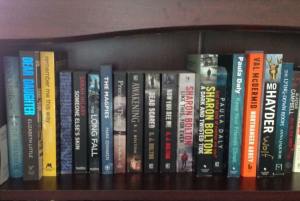It’s hard not to have favourites among publishers, although I primarily choose books and authors rather than from publishers’ catalogues. However, Virago (for women writers), Tuttle (for Japanese writers), Faber & Faber and Penguin Classics were my childhood favourites, and in recent years I have been impressed by Europa Editions, Gallic Books, Peirene Press, World Editions and Istros Books for their commitment to fiction in translation. One publisher who is unabashedly dedicated to genre fiction, especially thrillers and crime fiction, is Orenda Books and I have mentioned before how much I admire founder Karen Sullivan’s drive and energy in finding and promoting writers in the UK and abroad.
What is interesting about Orenda is that their list is made up of books which personally appeal to Karen, so they feature quite a mix of styles and subjects. Not all of them have sparked my interest, but the ones that have been in my ‘preferred genre’ have all been great picks, a surefire combination of commercial appeal and good writing. I will just mention here Nordic noir such as Ragnar Jonasson and Kati Hiekkapelto.
The two most recent titles I’ve read have been somewhat different, something which I would hesitate to label ‘psychological thrillers’, although they have their fair share of thrills and twists. They are stories which rip your heart and make you think long and hard.
 Yusuf Toropov: Jihadi – A Love Story
Yusuf Toropov: Jihadi – A Love Story
This is not the easiest of books to read, partly because of its themes (terrorism, random savagery, betrayal, misguided ideology – all uncomfortably close to real life and what I perceive the whole ‘war on terror’ to be), but above all because of its structure. The ‘document’ is largely written by a dead man, Thelonious Liddell, an intelligence officer accused of being a traitor, and is interspersed with comments very much like Post-It notes by a psychologist, who we gradually realise is in fact his wife Becky, herself an intelligence officer. But it’s worth persevering with, because it is unquestionably an important book for our times, a read that plunges you into the icy water of the costs and failures of ‘the war on terror’.
Thelonius’ memoir contains passages recounting significant moments from the point of view of two other characters whom he meets in the course of his assignment: Fatima, the devout interpreter, and the American soldier Mike Mazzoni, a nasty bully. Points of view, of course, which he is guessing at, which he cannot possibly know, but which sound very plausible (although the psychologist’s comments make fun of them). They really add to the story, but it does mean that you need to concentrate and read carefully. There are so many complex layers and allusions, that you probably need to read the book two or three times to get all the nuances.
And a word of warning for those of you who cannot bear cruelty to animals: in addition to descriptions of flechette attacks on civilian population, and some graphic scenes of torture, maiming and killing (on both sides of the divide), there is also a sad moment when Thelonious has to watch his cat Child die.
I read this in one breathless go, just couldn’t stop, the story is such that it takes you along on a voyage full of suspense, sadness, poignancy, drama. It is the story of a family – two families in fact, and the secrets and pressures which nearly tear them apart. When Bella’s mother dies, her father seems quite broken, about to share something with her but then changing his mind. A series of shocking discoveries makes Bella realise that everything she thought she knew about her life was wrong.
Her search for the truth takes her to Cornwall and another deeply damaged family. But reading the book as quickly as I did does not do it justice, because the writing is very subtle and perfectly judged. Throughout, the settings are conveyed with a great sense of atmosphere – not just Cornwall, but the Old Vicarage, the Bristol bolthole. The characters are complex and vividly described, behaving consistently but also in surprising ways – much like in real life. Some scenes very nearly made me cry, both by what was said and what was left unsaid.
There is also a dream-like, almost supernatural strand to the story – as enticing and mysterious as the sirens singing to Ulysses. A book which can be read on many levels: a romping good tale of unanswered questions and suspense, but also a poetic, thoughtful piece on the intricacies of human relationships, loss, regrets, identity and lost dreams.


 I read this as part of Tony Malone’s wonderful initiative
I read this as part of Tony Malone’s wonderful initiative 





